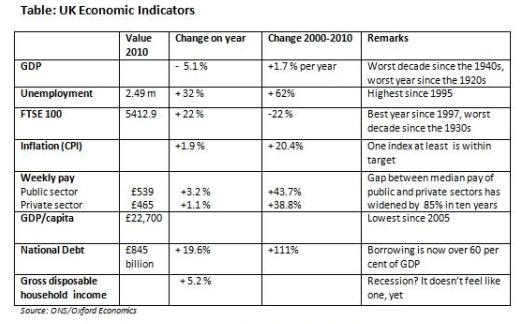UK Vital Signs: an economy in need of intensive care
New Year’s Day, and the end of a decade, is as good a time as any to look at the economy’s vital signs.
I’ve put together a Table of economic indicators that emphasise just how deep a hole the UK economy is in. None are new, but I haven’t seen them brought together in quite this way elsewhere. They show not only how damaging the recession has been in the short term, but what a comprehensive ruin it has made of Labour’s claims to economic mastery.
Stock market returns do not always parallel the real economy, but they too have taken a terrible beating. The FTSE 100 index is down 22 per cent on the decade and this year’s rise has made only a small dent in that dismal record.

Yet despite the figures, the recession so far has a whiff of the phoney war about it. As in 1940, everybody is waiting for things to get truly nasty.
Unemployment is up sharply, yet many people have yet to feel any pain. The clue lies in the final row of the table, showing that gross disposable household disposable income has risen sharply, even though GDP per capita is lower than it was in 2005.
In addition, public sector employment has risen under Labour and has so far been protected from any cuts. Wages and salaries have risen more quickly in the public than the private sector, shielding areas where public sector employment is high from any real impact. That helps to explain why the opinion polls are not quite as gloomy for Labour in the North.
The GDP per capita figure comes from the think tank Oxford Economics, which expects it to rise only modestly next year. That, coupled with the rise in VAT which comes into force tomorrow and the top rate of income tax on April 1, underlines what it calls “the new age of austerity”.
Measured in dollar terms, the UK’s decline is even more marked because sterling has fallen off a cliff in the past 18 months. In dollar terms, the UK’s GDP per capita has fallen from $45,890 in 2007 to $35,590 now, Oxford Economics concludes. The decline is less marked when measured by purchasing power parity.
So far, Keynes has provided a perfect alibi for the Government to go on spending, lest the recession get any deeper. With an election due, that’s a very useful alibi indeed, but the borrowing levels are now eye-watering. You have to admire Jack Straw’s chutzpah – this week in The Independent he accused the Conservatives of trying to “buy” the election, a charge that might more accurately be laid at the Government’s door.
When Government borrowing gets this high, there’s usually only one way out: devaluing the debt through rampant inflation. It would be a brave man who would bet against that in the next decade.



